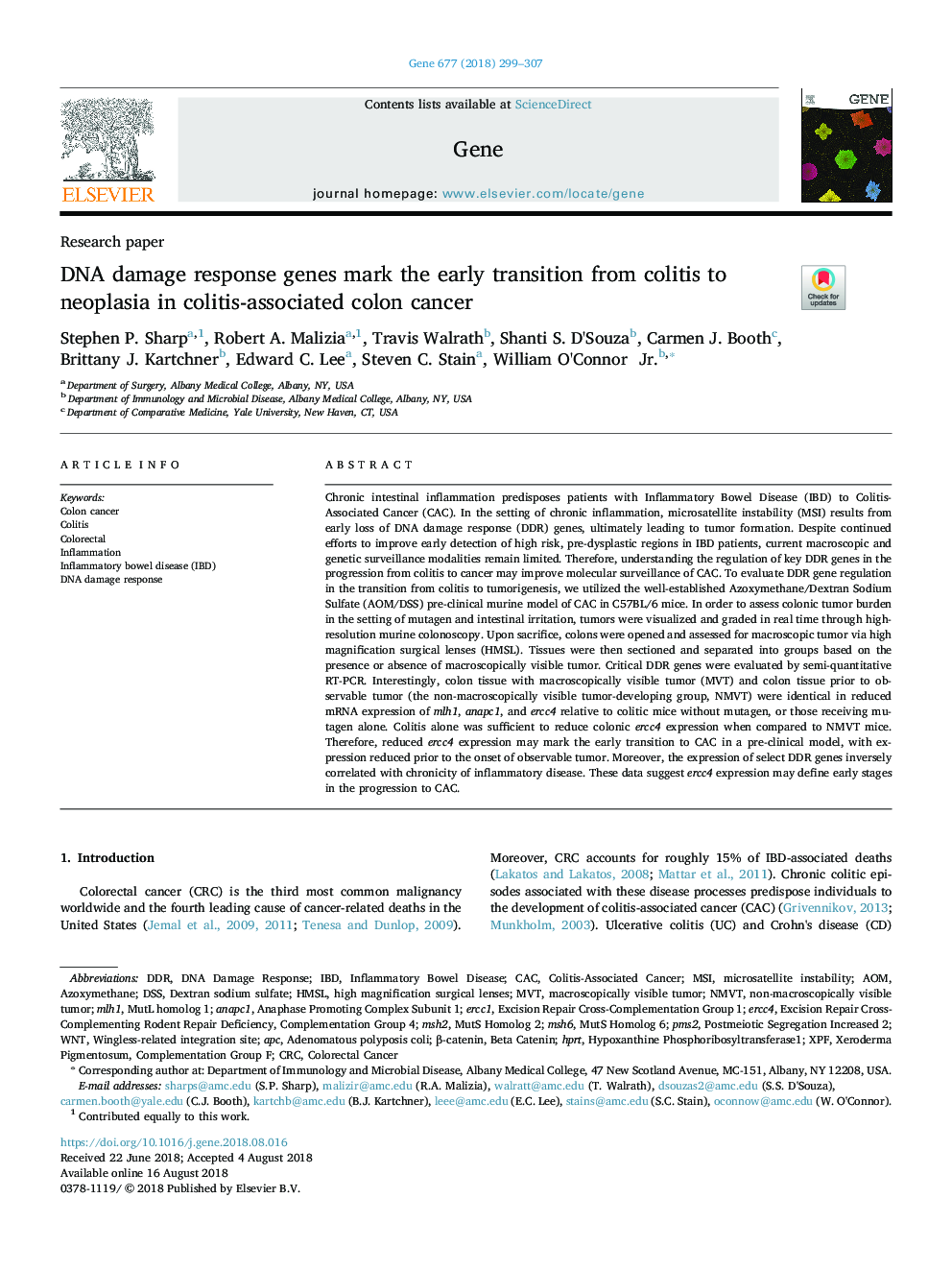| کد مقاله | کد نشریه | سال انتشار | مقاله انگلیسی | نسخه تمام متن |
|---|---|---|---|---|
| 8644429 | 1569759 | 2018 | 9 صفحه PDF | دانلود رایگان |
عنوان انگلیسی مقاله ISI
DNA damage response genes mark the early transition from colitis to neoplasia in colitis-associated colon cancer
دانلود مقاله + سفارش ترجمه
دانلود مقاله ISI انگلیسی
رایگان برای ایرانیان
کلمات کلیدی
APCMutS homolog 6PMS2MSH6MSH2MLH1HprtMSIWntazoxymethaneIBDAOMmvTDSSDDRERCC4CACXPFMutS homolog 2MutL homolog 1 - MutL همولوگ 1adenomatous polyposis coli - آدنوماتوز پولیپوزیس کولی یا آدنوماتوس پولیپوزیس کولای Colitis - التهاب روده بزرگinflammation - التهاب( توروم) beta catenin - بتا کاتنینMicrosatellite instability - بی ثباتی ریزماهواره ایInflammatory bowel disease (IBD) - بیماری التهابی روده (IBD)Inflammatory bowel disease - بیماریهای التهابی رودهexcision repair cross-complementation group 1 - ترمیم مجدد مکمل گروه 1wingless-related integration site - سایت یکپارچه سازی مرتبط با بیچارهColorectal cancer - سرطان روده بزرگcolitis-associated cancer - سرطان مرتبط با کولیتColon cancer - سرطان کولونdextran sodium sulfate - سولفات سدیم سدیمDNA damage response - واکنش به آسیب DNA ERCC1 - ژن ERCC1CRC - کد افزونگی دورهای Colorectal - کولورکتال
موضوعات مرتبط
علوم زیستی و بیوفناوری
بیوشیمی، ژنتیک و زیست شناسی مولکولی
ژنتیک
پیش نمایش صفحه اول مقاله

چکیده انگلیسی
Chronic intestinal inflammation predisposes patients with Inflammatory Bowel Disease (IBD) to Colitis-Associated Cancer (CAC). In the setting of chronic inflammation, microsatellite instability (MSI) results from early loss of DNA damage response (DDR) genes, ultimately leading to tumor formation. Despite continued efforts to improve early detection of high risk, pre-dysplastic regions in IBD patients, current macroscopic and genetic surveillance modalities remain limited. Therefore, understanding the regulation of key DDR genes in the progression from colitis to cancer may improve molecular surveillance of CAC. To evaluate DDR gene regulation in the transition from colitis to tumorigenesis, we utilized the well-established Azoxymethane/Dextran Sodium Sulfate (AOM/DSS) pre-clinical murine model of CAC in C57BL/6 mice. In order to assess colonic tumor burden in the setting of mutagen and intestinal irritation, tumors were visualized and graded in real time through high-resolution murine colonoscopy. Upon sacrifice, colons were opened and assessed for macroscopic tumor via high magnification surgical lenses (HMSL). Tissues were then sectioned and separated into groups based on the presence or absence of macroscopically visible tumor. Critical DDR genes were evaluated by semi-quantitative RT-PCR. Interestingly, colon tissue with macroscopically visible tumor (MVT) and colon tissue prior to observable tumor (the non-macroscopically visible tumor-developing group, NMVT) were identical in reduced mRNA expression of mlh1, anapc1, and ercc4 relative to colitic mice without mutagen, or those receiving mutagen alone. Colitis alone was sufficient to reduce colonic ercc4 expression when compared to NMVT mice. Therefore, reduced ercc4 expression may mark the early transition to CAC in a pre-clinical model, with expression reduced prior to the onset of observable tumor. Moreover, the expression of select DDR genes inversely correlated with chronicity of inflammatory disease. These data suggest ercc4 expression may define early stages in the progression to CAC.
ناشر
Database: Elsevier - ScienceDirect (ساینس دایرکت)
Journal: Gene - Volume 677, 30 November 2018, Pages 299-307
Journal: Gene - Volume 677, 30 November 2018, Pages 299-307
نویسندگان
Stephen P. Sharp, Robert A. Malizia, Travis Walrath, Shanti S. D'Souza, Carmen J. Booth, Brittany J. Kartchner, Edward C. Lee, Steven C. Stain, William Jr.,